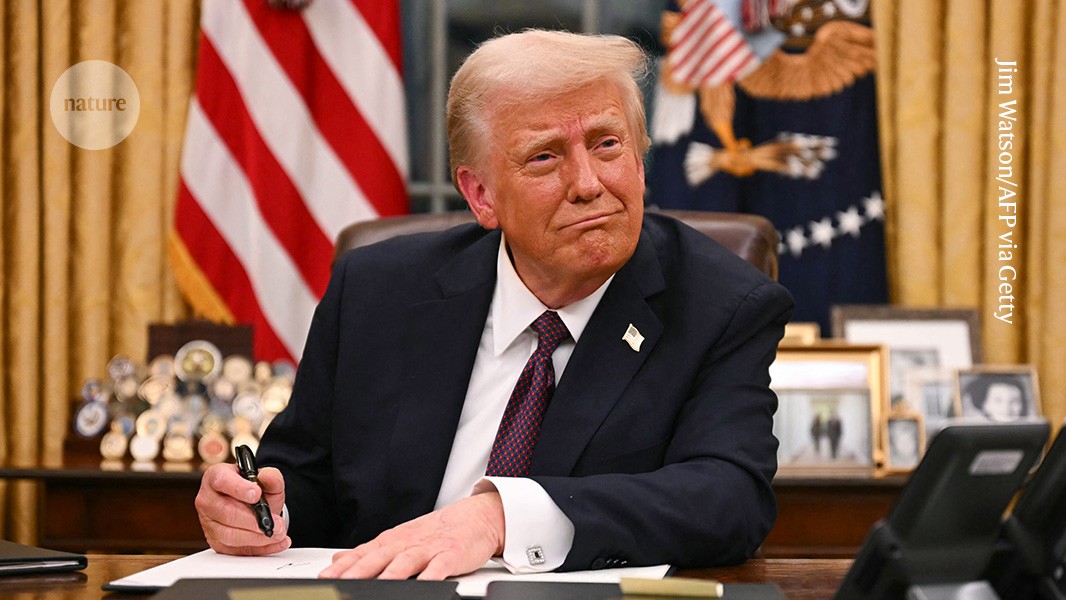What Trump’s flurry of executive orders means for science

The new president signed decrees designed to shift the US government’s stance on climate and public health

After his inauguration as US president on 20 January, Donald Trump signed executive orders in the White House.Credit: Jim Watson/AFP via Getty
Soon after being sworn in as the 47th President of the United States on Monday, Donald Trump signed a slew of executive orders that could reshape science at home and abroad. The orders — which direct the actions of the federal government but cannot change existing laws — are designed to shift policies and priorities on several scientific issues, including climate and public health. They also aim to cut the government workforce, which includes scientists, and potentially reduce its authority.
It remains unclear how much weight many of the orders will carry, but policy specialists who spoke to Nature say that they clearly mark the direction Trump intends to steer the United States during his second term in the White House.
“A lot of the power of executive orders is in the messaging,” says Gretchen Goldman, president of the Union of Concerned Scientists, an advocacy group based in Cambridge, Massachusetts. And the message thus far is clear, she says: “The administration is trying to undermine the government experts themselves, as well as the processes by which we make science-based decisions in government.”
Here Nature examines some of the executive orders that are most relevant to science.
Changing climate
Trump signalled in one order that — similar to his first presidency from 2017 to 2021 — he would pull the United States out of the 2015 Paris climate agreement. Citing both national security concerns and the impact of high energy prices that “devastate” American citizens, Trump also declared a ‘national energy emergency’ at home, an action that could enable his government to greenlight fossil-fuel-based energy projects.
Trump’s emergency order, one of many focusing on energy issues, would allow US agencies to identify energy projects where federal regulations and laws protecting, for instance endangered species, are holding up progress, according to the president. Agencies would then be authorized to move more quickly to approve projects, including through the use of “any lawful emergency authorities”.
But there are limits to what Trump can accomplish, because in many ways, “the economy trumps Trump”, says Mark Maslin, an Earth-system scientist at University College London. For instance, Maslin says, it’s now much cheaper to invest in renewable energy sources such as solar and wind than it used to be, and that means that investments in those technologies will continue.
Comparatively, Trump will have an easy time withdrawing the United States from the Paris accord, which commits nearly 200 countries to limiting Earth’s warming to 1.5–2 °C above pre-industrial levels. During Trump’s first presidency, his administration had to wait more than three years before formally withdrawing from the pact because of the rules of the agreement. Joe Biden, who succeeded Trump as US president, quickly rejoined. This time, the exit process will require only one year.
Although the Paris agreement will continue to function without the United States — the world’s second-largest emitter of greenhouse gases — many scholars worry that a US exit will inevitably reduce pressure on other countries to act. This follows Earth reaching its highest temperature on record last year, and scientists say that countries must increase efforts to curb emissions if they are to achieve the global goal.
“Anything delaying or halting that effort will lead to lives lost on the ground,” Goldman says.
In withdrawal
As expected, Trump also signed an order to withdraw the United States from the World Health Organization (WHO), a United Nations agency responsible for global health that the new president alleges mishandled the COVID-19 pandemic. He has also said that the United States pays a disproportionate amount of dues to the agency compared with other member nations.
Trump announced that the United States would leave the WHO in May 2020, during his first presidency, but because the process takes one year, Biden blocked it on his first day in office in 2021.
Enjoying our latest content?
Login or create an account to continue
- Access the most recent journalism from Nature's award-winning team
- Explore the latest features & opinion covering groundbreaking research
or
Sign in or create an accountdoi: https://doi.org/10.1038/d41586-025-00197-x
With additional reporting by Ewen Callaway and Miryam Naddaf.
This story originally appeared on: Nature - Author:Dan Garisto

















